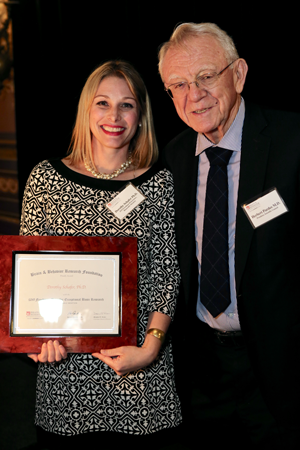
|
The Brain & Behavior Research Foundation has recognized Dorothy P. Schafer, PhD, for exceptional research into the role of microglia in regulating neural circuit structure and function as it relates to mental illness.
Dr. Schafer, assistant professor of neurobiology, received the 2019 Freedman Prize for Exceptional Young Scientists Honorable Mention. The prize, named after Daniel Freedman, MD, a neuropsychiatry pioneer, honors the work of outstanding scientists who have been supported by the foundation’s Young Investigator Grant Program, which Schafer received in 2016.
“This was one of the first grants that I was awarded as a new investigator. This served as a huge boost of confidence and gave me the support to pursue a new, high-risk direction in my lab. The outcome has been successful and the work has served as a foundation for exciting new scientific directions and increased funding. I am truly grateful for this award,” Schafer said.
Herbert Pardes, MD, president of the foundation’s scientific council, said that the award recognizes the “innovative thinking and remarkable talent across the field of neuropsychiatry.”
“Recognition for scientists early in their career helps them go on to receive further funding and is a precursor to further accomplishments. We applaud these researchers for their brilliant work,” Dr. Pardes said.
At UMass Medical School, the Schafer lab investigates the role of microglia, a resident and exquisitely plastic innate immune cell of the central nervous system, in regulating neural circuit structure and function.
Studies in autism spectrum disorders and neuropsychiatric disorders such as schizophrenia have revealed an abundance of inflammatory microglia. Recent genetic studies have also identified changes in genes associated with innate immune signaling, circuit function and neural activity in these disorders. These data indicate that microglia could play a central role in neural circuit dysfunction, whether through primary microglial mutations or secondary responses to genetic perturbations in neurons.
To gain a better understanding of how microglia regulate the development and function of neural circuits, Schafer's lab is using cell-specific molecular genetic approaches and high resolution imaging techniques to identify novel, disease relevant mechanisms by which microglia function within brain circuits. In the process, Schafer and colleagues uncovered a new mechanism by which microglia “listen” to changes in brain activity and subsequently remodel neural connectivity. They have also discovered a mechanism by which microglia regulate neural excitability and seizures through the release of neuroactive inflammatory molecules.
In the latter project, the Schafer lab genetically altered microglial inflammatory state, which resulted in enhanced seizures and increased neural excitability in mice. They are now uncovering microglial secreted factors that underlie these effects and they are determining whether these microglia-derived molecules could provide a mechanistic link by which changes in microglial inflammatory state affect neural circuit dysfunction in ASD and other neuropsychiatric disorders.
Related stories on UMassMedNow
Schafer lab receives Hood Foundation grant to study how microglia regulate development of brain circuitry
Dorothy Schafer studies how immune cells of the brain regulate brain circuit connectivity